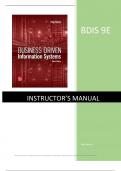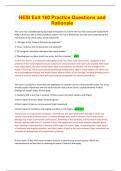BDIS 9E
INSTRUCTOR’S MANUAL
Paige Baltzan
© McGraw Hill LLC. All rights reserved. No reproduction or distribution without the prior written consent of McGraw Hill LLC.
,MANAGEMENT
INFORMATION SYSTEMS:
1
CHAPTER
BUSINESS DRIVEN MIS
This guide provides many classroom activities, videos, and debates to accompany BusinessDriven
Information Systems. A few course suggestions:
Create one or two test questions based on the classroom activity to help reward studentswho
attend lectures.
Many professors have found that assigning an activity and then lecturing on the materialhelps
students gain a deeper understanding of the core MIS concepts as they have already struggled
with applying the material to a real-world situation.
Asking a small group of students to explain their answer to the activity to the entire class after
completion ensures students come to class prepared. I select a different group eachactivity to
explain their answer and they do not want to look unprepared in front of their fellow classmates.
It is a powerful motivator to get my students reading prior to class. After the activity and
student’s presentations then I lecture – keeps my students engagedand helps to achieve a higher
level of learning outcomes as they are constantly tasked with applying the concepts during class.
Create an Ask the Professor Discussion board that runs the entire course where students can ask
course and content related questions. I typically promise to respond within 24 hours, and I
always encourage my students to check the discussion board before sendingan email. Many
times, if one student a question so does other students.
**Three Before Me Rule! This is something I have found that saves a great deal of time
answering email. I state the Three Before Me rule in my syllabus. Before a student comes to me
with a question, they must provide three sources they used to answer the question themselves.
This significantly cuts down on emails as many times students canfind the answer to their
questions, but it seems easier just to email the professor.
Sources can include the syllabus, the Ask the Professor Q&A Discussion Board, classmates,the
textbook, etc. If I ask the student for the three sources and they do not have them I dock
participation points. Works great on significantly cutting down my emails and helps to prepare my
students for the real world!
The core chapter material is covered in detail in the PowerPoint slides. Each slide containsdetailed
teaching notes including exercises, class activities, questions, and examples. Please review the
PowerPoint slides for detailed notes on how to teach and enhance the core chapter material.
Enjoy your course and best of luck! Please feel free to email me directly if you have any
questions, ideas, suggestions, or feedback! For additional course materials, content, and cases
visit www.baltzan.net or email me directly at pbaltzan@baltzan.net.
Page 1
,CHAPTER ONE
Information is everywhere. Information is a strategic asset. Without information, an
organization simply could not operate. This chapter introduces students to several core
business strategies that focus on using information to gain a competitive advantage,
including:
The core drivers of the information age
Data, information, business intelligence, knowledge
Systems thinking
Competitive advantages
SWOT analysis
Porter’s Five Forces model
Porter’s three generic strategies
Many of these concepts and strategies will be new to your students. Be sure to explain to
your students that this chapter offers an introduction to these concepts, and they will gain
asolid understanding of the details of these concepts as they continue reading the text.
SECTION 1.1 – BUSINESS DRIVEN MIS
Competing in the Information Age
The Challenge of Department Companies and the MIS Solution
SECTION 1.2 – BUSINESS STRATEGY
Identifying Competitive Advantages
SWOT analysis
The Five Forces Model – Evaluating Industry Attractiveness
The Three Generic Strategies – Choosing a Business Focus
SECTION 1. 1
BUSINESS DRIVEN MIS
This chapter provides an overview of Business Driven Information Systems (BDIS) along with
anticipated learning objectives for students. Explain to your students that the goal of this
chapter is to get them excited about BDIS and all the different business and technology
concepts they are going to learn. Let your students know that they are going to be introduced
to many new concepts that they might be unfamiliar with; however, these concepts are
discussed in detail throughout the text.
Page 2
, LEARNING OUTCOMES
Learning Outcome 1.1: Describe the information age and the differences between
data, information, business intelligence, and knowledge.
We live in the information age, when infinite quantities of facts are widely available to anyone
who can use a computer. The core drivers of the information age include data, information,
business intelligence, and knowledge. Data are raw facts that describe the characteristics of
an event or object. Information is data converted into a meaningful and useful context.
Business intelligence (BI) is information collected from multiple sources such as suppliers,
customers, competitors, partners, and industries that analyzes patterns, trends, and
relationships for strategic decision making. Knowledge includes the skills, experience, and
expertise, coupled with information and intelligence that creates a person’s intellectual
resources. As you move from data to knowledge you include more and more variables for
analysis resulting in better, more precise support for decision making and problem solving.
Learning Outcome 1.2: Explain systems thinking and how management
information systems enable business communications.
A system is a collection of parts that link to achieve a common purpose. Systems thinking is a
way of monitoring the entire system by viewing multiple inputs being processed or
transformed to produce outputs while continuously gathering feedback on each part.
Feedback is information that returns to its original transmitter (input, transform, or output)
and modifies the transmitter’s actions. Feedback helps the system maintain stability.
Management information systems (MIS) is a business function, like accounting and human
resources, which moves information about people, products, and processes across the
company to facilitate decision making and problem solving. MIS incorporates systems thinking
to help companies operate cross-functionally. For example, to fulfill product orders, an MIS
for sales moves a single customer order across all functional areas including sales, order
fulfillment, shipping, billing, and finally customer service. Although different functional areas
handle different parts of the sale, thanks to MIS, the customer the sale is one continuous
process.
CORE MATERIAL
The core chapter material is covered in detail in the PowerPoint slides. Each slide contains
detailed teaching notes including exercises, class activities, questions, and examples. Please
review the INSTRUCTOR PowerPoint slides for detailed notes on how to teach and enhance
the core chapter material. For additional course materials, content, and cases visit
www.baltzan.net or email me directly at pbaltzan@baltzan.net.
Page 3





